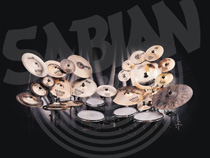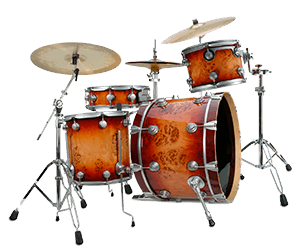
Your First Drumkit

The bottom line is, learn all you can about drum quality before you purchase a drum kit, don't be hasty, shop around and you will save money.
Or, maybe you just bought your first drum kit and you want toget started! Now what?
First, you should be familiar with the parts and names of your drums:
Click here for a detailed video on the parts of the Drum Set.
Next, you need to understand how to correctly set up your drum kit so that each piece is easy to reach and allows you to play comfortably:
Click here for a great video on setting up your drums.
Now that you're more familiar with your drum kit and are comfortable sitting at it, the next step is tuning. You need to make sure your drums sound good! Tuning your drums in itself can be quite a challenge. It takes a great deal of patience as well as plenty of "trial and error". Here's a great site I've found that contains a great deal of information regarding tuning styles, wood choices, etc.
Now, you're ready to start bashing on your kit! Here are a number of great resources to get you started on playing your first beats:
Beginning Drumset Lessons: Your First "beat" by Steve Houghton
Beginning Drumset Lessons: 8th note subdivisions
Remember, HAVE FUN!!
Buying Cymbals

Listen to the cymbal. Is it what you're after? Compare it with what you already have. Does it complement or fight against the sound of the other cymbals? Remember that different sounding cymbals CAN BE A POSITIVE BENEFIT to your sound and increase your flexibility.
Even though you are buying new, always look for signs of damage which may have occurred during transit, or by other people trying them out in the shop. Check for splitting or cracking around the bell, especially in smaller, thinner cymbals. Listen for buzzes and rattles which may indicate problems such as cracks at the edge, bow or bell.
DON'T think that you MUST buy cymbals of the same make or type. There are so many excellent cymbals out there. Not all are made by the top names. So there is plenty of opportunity to buy exactly the cymbal set that you want.
Buying Drumsticks

There are usually four basic types that every drumstick company makes. 7A drumsticks are slim and light. 5A and 5B drumsticks have more of a medium weight and are adaptable to many playing styles. The 2B is a thicker, heavy stick better suited for practice or heavy drum playing.
Beginning drummers may want to start with a 5A or a 5B and then experiment later on to see what difference in their playing a change in drumsticks can make. You may find it harder or easier with heavier or lighter sticks. The size of your hands and the strength of your arms can make the difference in the way you sound with various drumsticks.
Try different drumsticks until you get both the sound and the feel that you want from your drum kit. Heavier drumsticks will produce a heavier, meatier sound. Lighter sticks may be for soft playing or just a more comfortable feeling as you play. Take some time at your local music supply and examine the weight and feel of the sticks they have in stock. Many drum shops don't mind if you test them on a kit they have on display.
See what works best for you!



